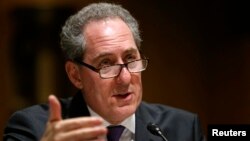U.S. Trade Representative Michael Froman defended rules governing trade in autos as part of a Pacific trade pact and warned that trying to renegotiate parts of the deal could unravel the whole thing.
The Trans-Pacific Partnership (TPP) will cut trade barriers for a dozen nations but has angered U.S. carmakers and some lawmakers by stopping short of sanctions against countries that deliberately weaken their currencies.
Froman said a separate declaration by TPP partners not to manipulate exchange rates was the first to tie currency rules to a trade deal and was "extremely meaningful."
"When you combine that with the potential opening of the Japanese market, the elimination of the 70 percent tariffs on autos into Vietnam, the elimination of the 30 percent tariffs into Malaysia, plus the elimination of non-tariff measures that are quite extensive in Malaysia, the increased opportunity to actually export autos ... we think this is a strong outcome," he said in comments approved for release on Thursday.
The deal stipulates that only 45 percent of a vehicle will have to be sourced from within the TPP, down from a comparable 50-percent-plus level under the two-decade old North American Free Trade Agreement rules, which are credited with driving an auto industry boom in Mexico.
The deal also sets a local sourcing threshold of 35 to 45 percent for individually-traded auto parts.
The TPP rules mean that more than half of a vehicle could be sourced from outside the 12 countries participating in the trade pact and still be sold in the United States - the bloc's largest market - without tariffs.
They will give Japan's auto industry, led by Toyota Motor, a freer hand to source parts from Asia, including from plants in locations outside the TPP zone, such as China.
But U.S. officials have stressed the local content rules are irrelevant until tariffs are removed. The agreement gives U.S. automakers, led by General Motors and Ford, 25 years' protection against auto imports and 30 years for trucks.
Some parts seen as sensitive for U.S. manufacturers, including turbo chargers, steering systems, lithium batteries and some ball bearings, will retain tariffs for 10 to 15 years.
Froman ruled out trying to reopen parts of the TPP, a move pushed by senior House of Representatives Democrat Sander Levin, who comes from the automaking state of Michigan. The complex pact was not like a bilateral trade deal, Froman said.
"Here we have 12 countries, half of whom we already have free trade agreements with, where every issue is tied to every other issue," he added. "You pull the string out on one of these issues and you unravel the whole thing."













